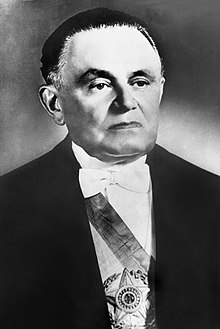Humberto de Alencar Castelo Branco
|
Marshal Castelo Branco |
|
|---|---|
 |
|
| 26th President of Brazil | |
|
In office 15 April 1964 – 15 March 1967 |
|
| Vice President | José Maria Alkmin |
| Preceded by | Ranieri Mazzilli |
| Succeeded by | Artur da Costa e Silva |
| Personal details | |
| Born |
20 September 1897 Fortaleza, Brazil |
| Died | 18 July 1967 (aged 69) Fortaleza, Brazil |
| Resting place | Castelo Branco Mausoleum, Fortaleza, Brazil |
| Nationality | Brazilian |
| Political party | ARENA |
| Spouse(s) | Argentina Vianna |
| Children | Nieta Paulo |
| Religion | Roman Catholicism |
| Military service | |
| Allegiance |
|
| Service/branch |
|
| Years of service | 1921–1964 |
| Rank |
|
| Commands | • 10th Military Region, headquartered in Fortaleza (1952–1954) • School of General Staff (1954–1956) • Garrison of the Amazon (1958–1960) • 8th Military Region, headquartered in Belém (1958–1960) |
| Battles/wars |
Second World War • Italian Campaign (1944–1945) |
Marshal Humberto de Alencar Castelo Branco Portuguese pronunciation: [ ũbɛʁtu dʒi alẽkaʁ kastɛlu bɾɐku] (20 September 1897 – 18 July 1967) was a Brazilian military leader and politician. He served as the first President of the Brazilian military government after the 1964 military coup d'etat. Castelo Branco was killed in an aircraft collision in July 1967, soon after the end of his Presidency.
Castelo Branco was born in a wealthy Northeastern Brazilian family. His father, Cândido Borges Castelo Branco, was a general. His mother, Antonieta Alencar Castelo Branco, came from a family of intellectuals (which included the writer José de Alencar).
He was married to Argentina Vianna, and had two children, Nieta and Paulo.
Castelo Branco joined the Brazilian Army in 1918. He was a student at the Escola Militar de Realengo military school in Rio de Janeiro, and in 1921 he joined the 12th Infantry Regiment in Belo Horizonte. In 1927 he returned to his military school as an infantry instructor. He was promoted to captain in 1938. As a captain, he studied in England.
Castelo Branco was promoted to a lieutenant colonel in 1943. During World War II, he was a colonel in the Brazilian Expeditionary Force which fought in Italy against Germany. He served as "Chief of the Operations Section" ("chefe de seção de operações") and is said to have spent 300 days in combat zones.
Subsequently Castelo Branco wrote many academic studies and treatises on the conduct of war. He was appointed Chief of Staff of the Army by President João Goulart in 1963 and a marshal (of reserves) in 1964.
...
Wikipedia
